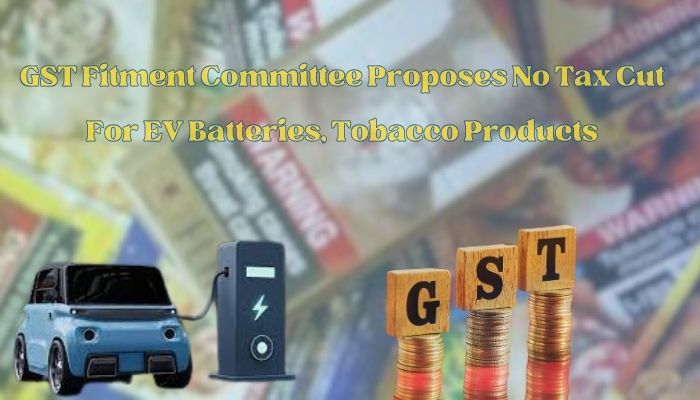The Goods and Services Tax (GST) fitment committee in India has made a significant decision that affects two diverse industries: electric vehicles (EVs) and tobacco. In this SEO article, we'll delve into the details of this decision, explore the demands of these industries, and assess the potential impact on the market and consumers.
Table of content
- Introduction
- Understanding GST and Its Significance
- The Demands of the Industries
- GST Fitment Committee's Decision
- Impact on the Electric Vehicle Industry
- Impact on the Tobacco Industry
- Reactions from Stakeholders
- Faqs
- Conclusion
Understanding GST and Its Significance
GST is a comprehensive tax system introduced in India in 2017. It aims to simplify the tax structure by replacing a cascade of indirect taxes with a unified tax system. However, the determination of tax rates falls under the purview of the GST fitment committee. These rates have a direct impact on various industries and significantly influence consumer choices.
The Demands of the Industries
-
Lowering GST on EV Batteries: The EV industry had sought a reduction in GST on batteries from the existing 18 percent to a more attractive 5 percent. This move was primarily aimed at making electric vehicles more affordable for consumers and bolstering the green mobility sector.
-
Uniform Additional Compensation Cess on Tobacco Products: On the other hand, the tobacco industry had advocated for a uniform additional compensation cess on various tobacco products. Such uniformity could potentially affect the pricing and consumption patterns of these products.
.jpg)
GST Fitment Committee's Decision
Despite these industry demands, the GST fitment committee has decided to maintain the current tax rates for both EV batteries and tobacco products. This decision is based on a range of factors and considerations.
- Factors Influencing the Decision: Explore the factors that led to the committee's decision, including economic considerations, revenue implications, and industry dynamics.
Impact on the Electric Vehicle Industry
The decision not to lower GST on EV batteries could have several consequences:
-
Affordability Concerns: Electric vehicles might remain relatively expensive due to the higher GST rate on batteries, potentially limiting their adoption among price-conscious consumers.
-
Sustainability Goals: A higher tax rate on batteries could slow down the government's efforts to promote eco-friendly transportation solutions and reduce carbon emissions.
Impact on the Tobacco Industry
Maintaining the status quo on tobacco product taxation also carries significant implications:
-
Pricing and Consumption Patterns: Uniform additional compensation cess on tobacco products could have had an impact on their pricing and consumption, potentially influencing public health.
-
Industry Strategies: The tobacco industry will continue to operate under the existing tax structure, which might shape their market strategies and product offerings.
Reactions from Stakeholders
This section examines the responses from various stakeholders:
-
EV Industry Reactions: Manufacturers, associations, and environmentalists may express their opinions, highlighting missed opportunities for growth and sustainability.
-
Tobacco Industry Reactions: Tobacco manufacturers and related stakeholders might express relief at the maintenance of the current tax rates.
FAQS
1. What is the GST fitment committee's recent decision regarding tax rates?
- The GST fitment committee has decided not to lower tax rates for electric vehicle (EV) batteries and tobacco products, maintaining the existing rates.
2. What is GST, and why is it significant?
- GST stands for Goods and Services Tax, a comprehensive tax system introduced in India in 2017. It's significant because it simplifies the tax structure and impacts various industries and consumer choices.
3. What were the demands made by the EV and tobacco industries?
- The EV industry demanded a reduction in GST on batteries from 18 percent to 5 percent, while the tobacco industry sought a uniform additional compensation cess on tobacco products.
4. What were the potential benefits of lowering GST on EV batteries?
- Lowering GST on EV batteries could make electric vehicles more affordable for consumers and support the growth of the green mobility sector.
5. How does the GST fitment committee make decisions on tax rates?
- The committee considers various factors, including economic implications, revenue considerations, and industry dynamics, when making decisions about tax rates.
6. What could be the consequences of maintaining the current tax rates on EV batteries?
- Maintaining the existing tax rates on EV batteries might impact the affordability of electric vehicles, potentially limiting their adoption among price-conscious consumers.
7. How does this decision affect the government's sustainability goals for electric vehicles?
- A higher tax rate on EV batteries could slow down the government's efforts to promote eco-friendly transportation solutions and reduce carbon emissions.
8. What potential impact could a uniform additional compensation cess have on tobacco products?
- A uniform additional compensation cess on tobacco products could affect their pricing and consumption patterns, potentially influencing public health outcomes.
9. How are stakeholders from the EV and tobacco industries reacting to the decision?
- Stakeholders in the EV industry may express disappointment at missed growth opportunities, while the tobacco industry may express relief at the maintenance of current tax rates.
10. What should businesses and consumers do in response to this decision?
- Businesses and consumers should stay informed about tax policies as they evolve and make informed decisions in a dynamic economic landscape. They should also monitor developments in India's GST landscape leading up to the upcoming GST Council meeting.
Conclusion
In conclusion, the GST fitment committee's decision not to lower tax rates for EV batteries and tobacco products has raised critical questions about affordability, sustainability, and public health. Staying informed about tax policies is essential, as they significantly impact industries and consumer choices.


.jpg)
